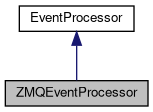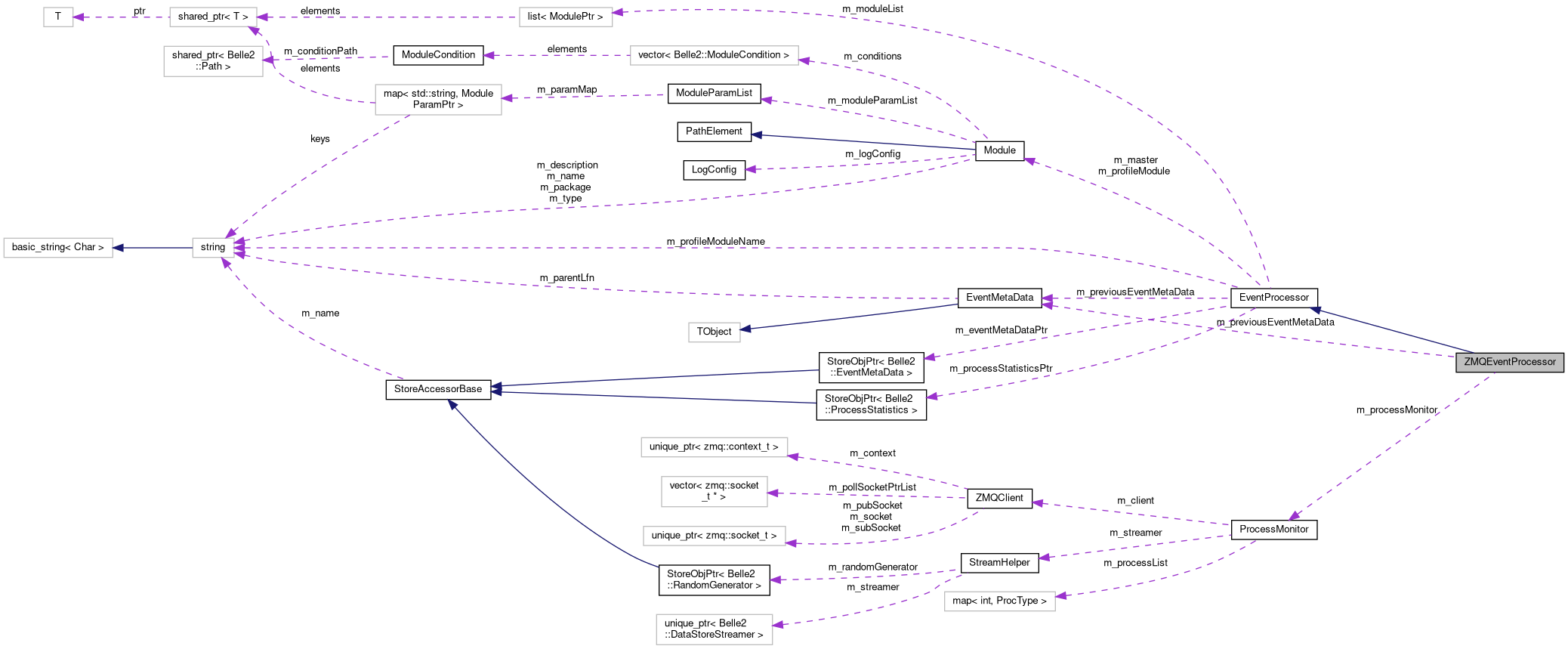This class provides the core event processing loop for parallel processing with ZMQ.
More...
#include <ZMQEventProcessor.h>
|
|
| ZMQEventProcessor () |
| | Init the socket cleaning at exit.
|
| |
|
virtual | ~ZMQEventProcessor () |
| | Make sure we remove all sockets cleanly.
|
| |
|
void | process (const PathPtr &spath, long maxEvent) |
| | Processes the full module chain using parallel processing, starting with the first module in the given path.
|
| |
|
void | cleanup () |
| | clean up IPC resources (should only be called in one process).
|
| |
| void | setProfileModuleName (const std::string &name) |
| | Set the name of the module we want to profile. More...
|
| |
|
|
static void | writeToStdErr (const char msg[]) |
| | async-safe method to write something to STDERR.
|
| |
|
static void | installSignalHandler (int sig, void(*fn)(int)) |
| | Install a signal handler 'fn' for given signal.
|
| |
| static void | installMainSignalHandlers (void(*fn)(int)=nullptr) |
| | Install signal handler for INT, TERM and QUIT signals. More...
|
| |
|
| void | initialize (const ModulePtrList &moduleList, const ModulePtr &histogramManager) |
| | First step in the process: init the module in the list. More...
|
| |
|
void | forkAndRun (long maxEvent, const PathPtr &inputPath, const PathPtr &mainPath, const PathPtr &outputPath, const ModulePtrList &terminateGlobally) |
| | Second step in the process: fork out the processes we need to have and call the event loop.
|
| |
|
void | terminateAndCleanup (const ModulePtr &histogramManager) |
| | Last step in the process: run the termination and cleanup (kill all remaining processes)
|
| |
|
void | runMonitoring (const PathPtr &inputPath, const PathPtr &mainPath, const ModulePtrList &terminateGlobally, long maxEvent) |
| | Start the monitoring (without forking)
|
| |
|
void | runInput (const PathPtr &inputPath, const ModulePtrList &terminateGlobally, long maxEvent) |
| | Fork out the input process.
|
| |
|
void | runOutput (const PathPtr &outputPath, const ModulePtrList &terminateGlobally, long maxEvent) |
| | Fork out the output process.
|
| |
|
void | runWorker (unsigned int numProcesses, const PathPtr &inputPath, const PathPtr &mainPath, const ModulePtrList &terminateGlobally, long maxEvent) |
| | Fork out the N worker process.
|
| |
|
void | processPath (const PathPtr &localPath, const ModulePtrList &terminateGlobally, long maxEvent) |
| | Basic function run in every process: process the event loop of the given path.
|
| |
|
void | processCore (const PathPtr &startPath, const ModulePtrList &modulePathList, long maxEvent=0, bool isInputProcess=true, bool isWorkerProcess=false, bool isOutputProcess=false) |
| | Process modules in the path.
|
| |
|
bool | processEvent (PathIterator moduleIter, bool skipMasterModule, bool Worker=false, bool output=false) |
| | Calls Event function.
|
| |
|
void | processBeginRun (bool skipDB=false) |
| | Calls BeginRun function.
|
| |
|
void | processEndRun () |
| | Calls EndRun function.
|
| |
This class provides the core event processing loop for parallel processing with ZMQ.
Definition at line 23 of file ZMQEventProcessor.h.
◆ callEvent()
| void callEvent |
( |
Module * |
module | ) |
|
|
protectedinherited |
Calls event() on one single module, setting up logging and statistics as needed.
- Parameters
-
| module | Module to call the event() function |
Definition at line 226 of file EventProcessor.cc.
◆ initialize()
First step in the process: init the module in the list.
TFiles are stored in a global list and cleaned up by root since this will happen in all forked processes, these will be corrupted if we don't clean the list!
needs to be called at the end of every process.
Definition at line 174 of file ZMQEventProcessor.cc.
176 if (histogramManager) {
177 histogramManager->initialize();
182 B2INFO(
"ZMQEventProcessor : processInitialize done");
186 B2ERROR(
"There is no module that provides event and run numbers. You must either add the EventInfoSetter module to your path, or, if using an input module, read EventMetaData objects from file.");
191 if (numLogError != 0) {
192 B2FATAL(numLogError <<
" ERROR(S) occurred! The processing of events will not be started.");
203 gROOT->GetListOfFiles()->Clear(
"nodelete");
void processInitialize(const ModulePtrList &modulePathList, bool setEventInfo=true)
Initializes the modules.
const Module * m_master
The master module that determines the experiment/run/event number.
@ c_Error
Error: for things that went wrong and have to be fixed.
int getMessageCounter(LogConfig::ELogLevel logLevel) const
Returns the number of logging calls per log level.
static LogSystem & Instance()
Static method to get a reference to the LogSystem instance.
◆ installMainSignalHandlers()
| void installMainSignalHandlers |
( |
void(*)(int) |
fn = nullptr | ) |
|
|
staticinherited |
Install signal handler for INT, TERM and QUIT signals.
If argument is NULL, EventProcessor's own signal handler will be installed.
Definition at line 312 of file EventProcessor.cc.
◆ processCore()
| void processCore |
( |
const PathPtr & |
startPath, |
|
|
const ModulePtrList & |
modulePathList, |
|
|
long |
maxEvent = 0, |
|
|
bool |
isInputProcess = true |
|
) |
| |
|
protectedinherited |
Processes the full module chain consisting of an arbitrary number of connected paths, starting with the first module in the specified path.
- Parameters
-
| startPath | The processing starts with the first module of this path. |
| modulePathList | A list of all modules which could be executed during the data processing (used for calling the beginRun() and endRun() method). |
| maxEvent | The maximum number of events that will be processed. If the number is smaller or equal 0, all events are processed. |
| isInputProcess | true when this is either the only or the input process |
Definition at line 406 of file EventProcessor.cc.
◆ processEvent()
| bool processEvent |
( |
PathIterator |
moduleIter, |
|
|
bool |
skipMasterModule |
|
) |
| |
|
protectedinherited |
Calls event() functions on all modules for the current event.
Used by processCore.
- Parameters
-
| moduleIter | iterator of the path containing all the modules |
| skipMasterModule | skip the execution of the master module, presumably because this is the first event and it's already been done in initialize() |
- Returns
- true if execution should stop.
Definition at line 321 of file EventProcessor.cc.
◆ processInitialize()
| void processInitialize |
( |
const ModulePtrList & |
modulePathList, |
|
|
bool |
setEventInfo = true |
|
) |
| |
|
protectedinherited |
Initializes the modules.
Loops over all module instances specified in a list and calls their initialize() method.
- Parameters
-
| modulePathList | A list of all modules which could be executed during the data processing. |
| setEventInfo | if true the first event call of the master module will be called immidiately to load the event info right away so that it's available for subsequent modules |
Definition at line 242 of file EventProcessor.cc.
◆ processTerminate()
Terminates the modules.
Loops over all module instances in reverse order specified in a list and calls their terminate() method.
- Parameters
-
| modulePathList | A list of all modules which could be executed during the data processing. |
Definition at line 440 of file EventProcessor.cc.
◆ setProfileModuleName()
| void setProfileModuleName |
( |
const std::string & |
name | ) |
|
|
inlineinherited |
Set the name of the module we want to profile.
- Parameters
-
| name | Name of the module as returned by getName() |
Definition at line 57 of file EventProcessor.h.
The documentation for this class was generated from the following files:



